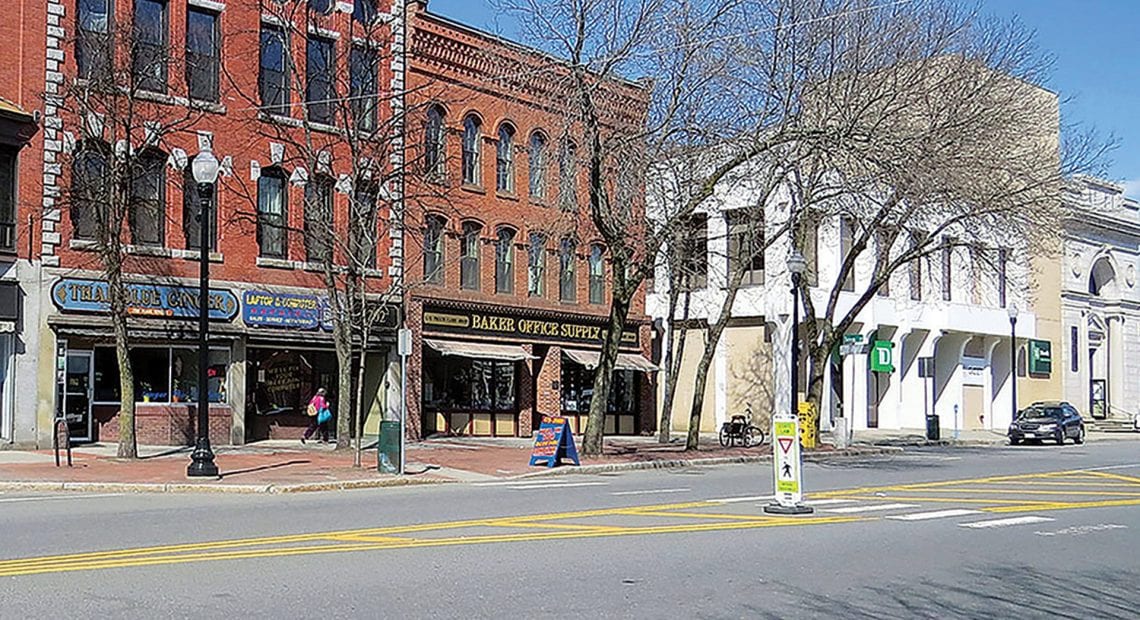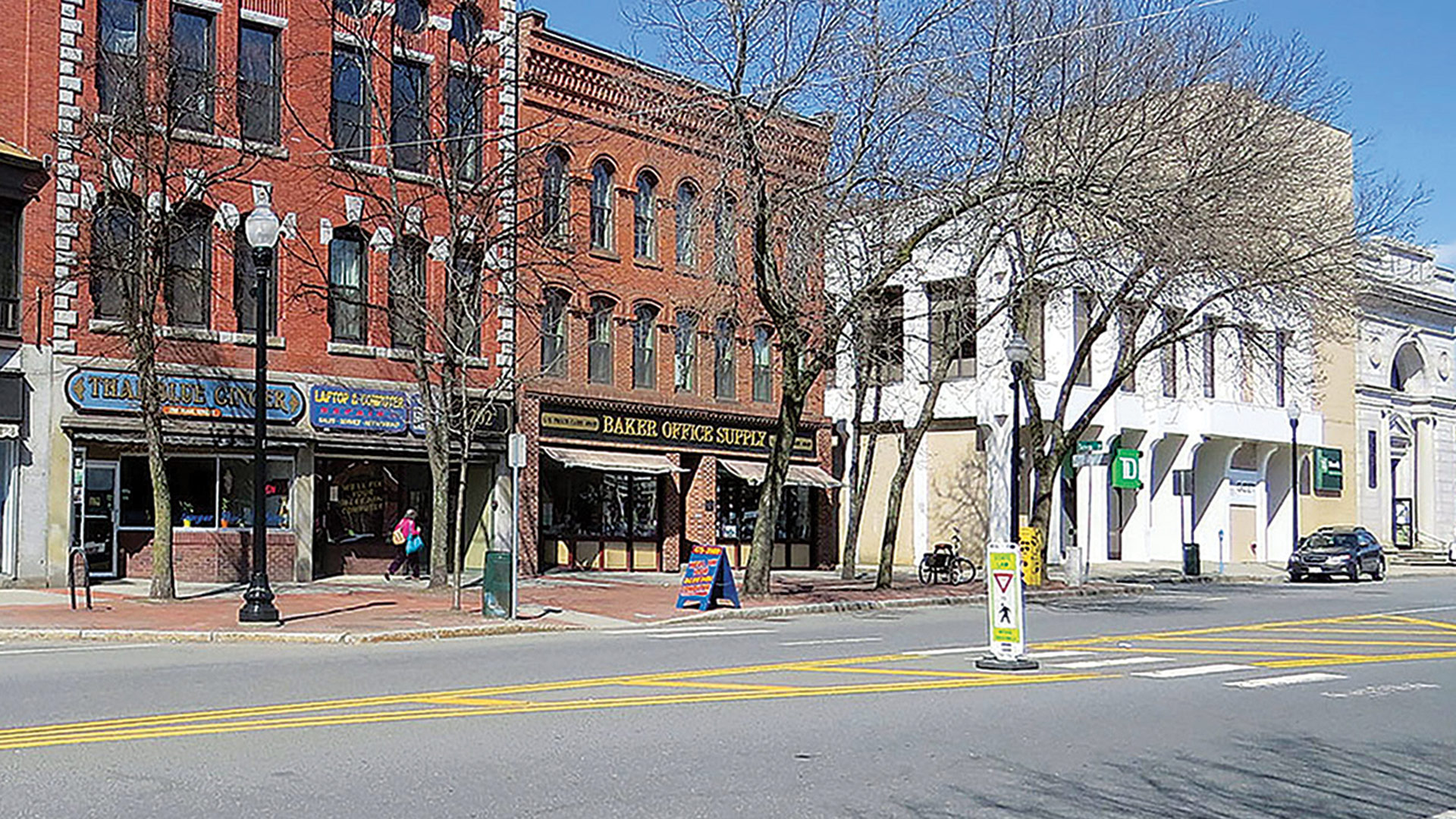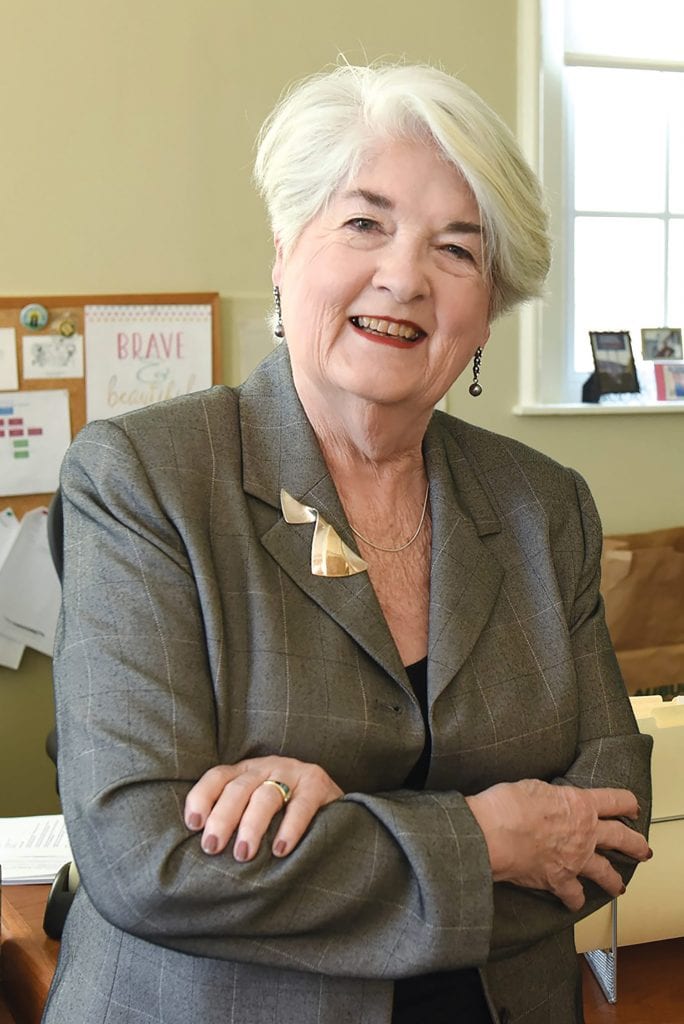
Pandemic Doesn’t Halt Greenfield’s Progress
Community Spotlight
By Mark Morris

For MJ Adams, 2020 felt like someone had pushed a ‘pause’ button.
Adams, director of Community and Economic Development for the city of Greenfield, had taken part in a dynamic public forum early in the year titled “A Deliberate Downtown” that focused on revitalization plans for Greenfield.
Then the pandemic hit. And when it became clear the pause would last for more than a few weeks, she and her staff shifted their focus.
“We knew there was going to be an immediate cash-flow problem for local businesses, so we moved quickly to develop a small-business assistance program to provide micro-enterprise grants,” Adams said.
Working with other Franklin County towns, Greenfield pooled its available block-grant funds with those from Montague, Shelburne, and Buckland.
“Because small businesses are such a critical piece of the economy in Greenfield and Franklin County, we worked together to quickly design a program that didn’t exist before,” Adams said. “The micro-enterprise grants provided a cash source for small businesses until they were able to access funds from the federal Paycheck Protection Program.”
On the public-health side of the pandemic, Mayor Roxann Wedegartner credited the emergency-management team in Greenfield for their early and quick action.
“We were one of the first communities in the state to attempt to manage the public-health side of COVID-19 from the get-go,” she said, adding that her team also set up contact tracing early in the pandemic. The John Zon Community Center has served as an emergency-command area for COVID testing for Greenfield and surrounding communities. First responders are now able to receive COVID-19 vaccinations at the facility.

Greenfield Mayor Roxann Wedegartner says major projects along Main Street speak to a sense of momentum despite pandemic-related obstacles.
Like most communities, Wedegartner admits Greenfield has taken an economic hit due to the pandemic. She pointed to the micro-enterprise grants as an important early step that prevented a tough situation from becoming worse. Inaugurated to her first term as mayor a year ago, Wedegartner said finding herself in emergency public-health and safety meetings a month later was quite a shock.
“While I’m pleased that we started planning early for the pandemic, I have to say it’s not where I thought I would be in my first year in office.”
Great Outdoors
Wedegartner is not letting COVID-19 challenges dampen the many good things happening in Greenfield. She pointed with pride to the approval of a new, $20 million library and the ongoing construction of a new, $17 million fire station. Groundbreaking at the library is scheduled for April 21, while firefighters are expected to move into their new facility in July. Once complete, Adams noted that both ends of Main Street will be anchored with major public investments.
“It’s a clear statement that the town is very much committed to public safety, as well as culture and education,” she said.
These qualities, and a resilient business community, are why Greenfield is poised to bounce back quickly, according to Diana Szynal, executive director of the Franklin County Chamber of Commerce. She specifically mentioned the area’s many outdoor recreation options as assets that contribute to the local economy.
“Because small businesses are such a critical piece of the economy in Greenfield and Franklin County, we worked together to quickly design a program that didn’t exist before.”
“For spring and summer, we will put a strong focus on outdoor recreation because it’s a safe and healthy thing to do,” Szynal said. “You don’t have to travel far, and you can access some of the best river rapids around. We have ski areas and great golf courses — basically four seasons of outdoor activities.”
Before the pandemic, Adams and her staff were working with local restaurants to consider outdoor dining. Of course, COVID-19 accelerated those plans as moving outside was one way eateries could generate at least some revenue. With restaurants scrambled to figure out ad hoc ways to set up outside, Adams said now is the time to see how to make this concept work better for everyone for the long haul.
“We’re looking at Court Square to see if we can shut down the street that runs in front of City Hall to make that a more permanent outdoor dining space,” she said, admitting there are traffic-impact and access issues that need to be considered before the street can be closed. “We’ve been wanting to do this for some time and even have conceptual drawings to see how that space would look.”
Szynal emphasized that restaurants are one key to bringing more people to downtown Greenfield, so she hopes to draw more places to eat. While outdoor dining presents challenges, she believes the net result is positive. “Dining outside helps the downtown become a little more pedestrian. It’s a different vibe, a good vibe.”
Greenfield at a Glance
Year Incorporated: 1753
Population: 17,456
Area: 21.9 square miles
County: Franklin
Residential Tax Rate: $23.55
Commercial Tax Rate: $23.55
Median Household Income: $33,110
Median Family Income: $46,412
Type of Government: Mayor, City Council
Largest Employers: Baystate Franklin Medical Center, Greenfield Community College, the Sandri Companies
* Latest information available
Wedegartner promotes the fact that Greenfield has a walkable downtown and plenty of housing within a short walk of it. A former Realtor in Franklin County, she still has contacts in real estate who tell her that houses in Greenfield barely hit the market before they are sold.
Adams said the city is poised to take advantage of welcoming new people to the area. “As we start to emerge from the pandemic, there’s a discussion about how much people miss the feeling of community and how to re-establish that. At the same time, there are people who want to live closer to nature and further away from the heavily populated cities. Greenfield can satisfy both of those concerns.”
Because the pandemic has resulted in so many people working from home, Szynal predicts a shift in where people choose to live.
Wedegartner concurred, citing the example of a couple who recently moved to Greenfield from the Boston area after learning they would be working from home for the next two years. “They bought one of the more beautiful homes in town for a fraction of what they would have paid for that type of home in the Boston area.”
While real-estate sales have been brisk across Western Mass., Franklin County has been particularly robust. Szynal shared statistics from October that compared sales among Hampden, Hampshire, and Franklin counties. Total sales for all three were up 9.2%, while in Franklin County alone, sales increased more than 32%. She credits that growth to a number of factors, including the affordability of housing and an active arts and culture scene.
“If you have the ability to work remotely,” she asked, “why not relocate to somewhere that is beautiful and more affordable?”
Downtown Vision
Wilson’s Department Store, a mainstay in Greenfield for more than a century, wrapped up its final sales and closed last February. While that came as sad news to many, Wedegartner and Adams are hopeful about interest in the building from Green Fields Market, the grocery store run by the Franklin Community Co-op. While Green Fields representatives have not committed to the Wilson’s site, they have shown an interest in locating downtown.
“I would love to keep the co-op downtown,” Adams said. “A grocery store where you have residents living is an important part of a livable, walkable downtown.”
A former brownfield site, the Lunt Silversmith property has been cleaned up and will be available for redevelopment later this year. The site is near what Adams called “the recovery healthcare campus” where Behavioral Health Network and a number of other social-service agencies provide care and support for people in recovery.
Another redevelopment project involves the First National Bank building across from the town common. Adams said the initial vision was to make the building an arts and cultural space. After studying that as a possibility, it now appears that’s not going to happen.
The building is important, Adams noted, because it provides a face to the town common. “While the First National Bank building won’t be what we originally hoped it would be, our challenge is to figure out the right use for it.”
Just before COVID-19 hit, Adams and her team conducted a survey of residents and businesses to help define the future of downtown Greenfield. The large number of responses from both residents and businesses impressed even the survey consultants.
“The high rate of return on the surveys speaks to people’s interest and engagement of what our future will look like,” Adams said.
As people start receiving the vaccine, she believes the region will be able to put the coronavirus era in the rear-view mirror fairly soon.
“I’m a planner, so it’s exciting that there is a plan to get people vaccinated and that we are headed in the right direction,” she said.
Which would finally get the city off that pause button — and into ‘go’ mode.




